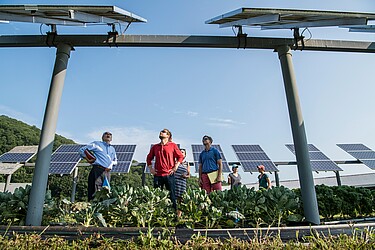

One of the many frightening things about the COVID-19 pandemic is the way it has exposed the fragility of our society. Virus test shortages, health equipment shortages, even toilet paper shortages – all have served as a reminder that we are not nearly as secure as we like to think.
Undoubtedly, policymakers and corporate leaders will use the crisis as an opportunity to make important changes to policy and strategy. As President Obama’s chief of staff Rahm Emanuel – possibly channelling the spirit of Sir Winston Churchill – quipped during the Great Recession of 2007-2009, you never want to waste a “good” crisis. But I think it’s also important to recognize that the institutions I study – social enterprises – are likely to play a growing role in the post-pandemic era.
She researches the creation, functioning and evolution of institutions for collective action, past and present, from the early modern period in Europe until today. Institutions for collective action are forms of organizations formed from below by the immediate stakeholders, with the aim of working together to pursue personal, material and societal interests. She has been president of the International Association for the Study of the Commons and has set-up the peer-reviewed International Journal of the Commons. In the past 10 years, she has received several large research grants, including an ERC Starting Grant and an NWO-VIDI grant.

She researches the creation, functioning and evolution of institutions for collective action, past and present, from the early modern period in Europe until today. Institutions for collective action are forms of organizations formed from below by the immediate stakeholders, with the aim of working together to pursue personal, material and societal interests. She has been president of the International Association for the Study of the Commons and has set-up the peer-reviewed International Journal of the Commons. In the past 10 years, she has received several large research grants, including an ERC Starting Grant and an NWO-VIDI grant.
Institutions for collective action tend to grow more popular in times like ours, when groups of people start to feel that their society’s institutions aren’t looking after their personal interests…
Such citizens’ initiatives have been growing rapidly since 2005, shortly before the financial crisis. With the benefit of hindsight, I think we can see in that wave of growth an indication that many markets and governments were already failing to provide some products and services that many people wanted. For example, in Dutch elderly care, you see that in many parts of the Netherlands there is only a minimal offering, which people don’t find sufficient or of good enough quality. To change that, they have joined together with other citizens with similar needs to create their own initiatives. At some point their campaigns often professionalize and develop into enterprises, but even then, not of the regular profit-focused kind.
Many of these efforts are continuing today, joined by newer organisations focused on addressing other problems, such as access to healthy, sustainably grown food. Since the coronavirus lockdown, particularly, many citizens seem much more concerned about where their food comes from and would like a much shorter distance between the farm and their table.
Others, anxious about the environmental consequences and health risks of the meat industry, are getting together to invest in new ways of creating protein and avoiding meat production. The growth of some of these organisations has been rapid. One in the Netherlands dedicated to buying land for organic farming has raised €1.5 million in the past two years, and recently signed on its 8,000th member. People with more specific concerns have also joined forces. For example, freelancers in the Netherlands, overlooked by the private insurance market, have organised broodfondsen (“bread funds”), mutual insurance funds that members can tap into if they fall ill.
As organisations, institutions for collective action tend to have some special features. First, face-to-face meetings of the members tend to be important, especially in the early days of the organisation’s formation. Historically, regular, in-person meetings were part of how they internalised the decisions they made as a group and built trust between the members.

The democratic nature of these collective organizations also gives them an advantage over both private companies and public agencies: the members don’t have to guess what the customers want because they are the customers. Putting the citizens who are the ones who need to be convinced of the value of the product in terms of sustainability at the beginning of the production process may make it easier to create a critical mass of consumers who are willing to go along with your story. Maybe because customers by definition participate in the design of the product in such collectivities, this type of social enterprises can be quite long-lived. Rabobank, for instance, started as a farmer’s co-operative bank in the Netherlands in the 19th century, as did the Raiffeisen Bank in Austria.



Producers, too, have often managed to build long-lived enterprises, for a similar reason. FrieslandCampina started on the same co-operative footing and proved to be successful: the 149-year-old FrieslandCampina dairy co-operative is now a €11 billion firm but it’s still a co-operative, representing 17,413 Dutch dairy farmers. Interestingly, as co-operatives have grown more fashionable again, some of the bigger ones are rediscovering their roots. They read in the newspaper there’s a new wave of co-operatives, and they think, “Hey, wait a minute. We too were a co-operative once. Oh, we still are. Oh my – what does that really mean?”
Often, private enterprises see what citizens are achieving through collective action, and decide it could be a profitable opportunity, or the government sees what a group has done and decides to extend similar services to a larger group. In our own time, for instance, a number of small towns in Germany, where locals formed their own green electric grids, served as a powerful example to the national government and private power companies that green energy could be delivered economically.
By considering a more diverse palette for governance of social enterprises, and including
also those set up by citizens, it might become easier to create growth for social enterprises in general. Citizens will be encouraged to invest more readily in such organisations, as they maintain a say over how their investment is used. At the same time, involving the general public in businesses with their focus on social justice and sustainability may also lead to more pro-social behaviour among citizens. And more pro-social behaviour, whereby actions are intended to help or benefit another individual or group of individuals, is exactly what we will need if we hope to face the next crises that are undoubtedly on their way, and which may prove even graver and more frustrating than the current pandemic.

Science Communication and Media Officer
Rotterdam School of Management, Erasmus University (RSM) is one of Europe’s top-ranked business schools. RSM provides ground-breaking research and education furthering excellence in all aspects of management and is based in the international port city of Rotterdam – a vital nexus of business, logistics and trade. RSM’s primary focus is on developing business leaders with international careers who can become a force for positive change by carrying their innovative mindset into a sustainable future. Our first-class range of bachelor, master, MBA, PhD and executive programmes encourage them to become to become critical, creative, caring and collaborative thinkers and doers.
